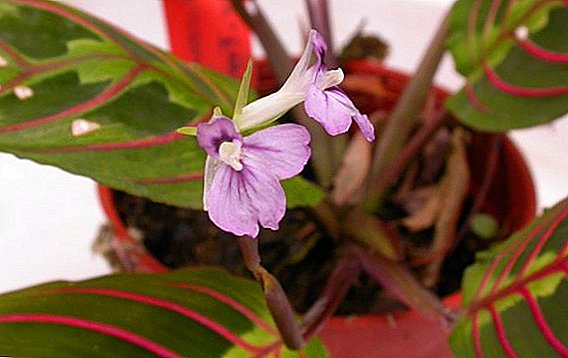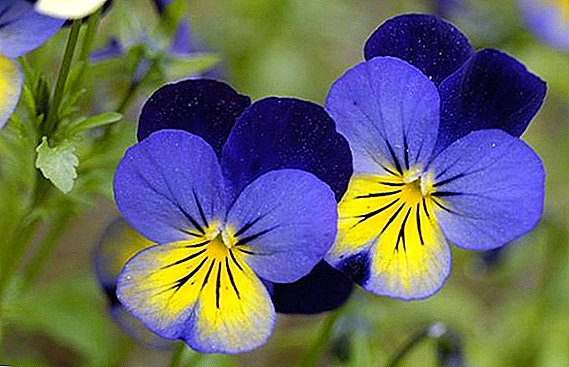 Her flirty eyes will not leave indifferent any passerby. Gentle wild flower, cute weed, bright decoration of flowerbeds and window sills, as well as a medicinal plant. This is a tricolor violet. She has many names: viola, Ivan-da-Marya, brother-and-sister, three flowers, moths. But the most popular of them - pansies.
Her flirty eyes will not leave indifferent any passerby. Gentle wild flower, cute weed, bright decoration of flowerbeds and window sills, as well as a medicinal plant. This is a tricolor violet. She has many names: viola, Ivan-da-Marya, brother-and-sister, three flowers, moths. But the most popular of them - pansies.
Description of violet
A tricolor violet is not confused with any other flower, as can be seen from its description. Pansies - undersized herbaceous plant, single or biennial.
It blooms immediately after the winter and before the autumn cold. Branched stems from 10 to 30 cm, sometimes rise to 50 cm. The toothed leaves of different shapes: in the basal rosette, they are ovate on long petioles, and on the stems - elongated-oval, alternate, on gentle petioles.
The flowers have a characteristic color and a special structure: the two upper petals are of a dark color, most often purple or blue, two medium - the same color, but a lighter shade, and the bottom one is triangular, yellow or multicolored.  Flowers are quite large, if they grow in the sun, and small in the shade. Glade with profiles creates the impression of many curious eyes, watching what is happening around.
Flowers are quite large, if they grow in the sun, and small in the shade. Glade with profiles creates the impression of many curious eyes, watching what is happening around.
Violet tricolor distributed in Europe and Asia. It can be seen on the roadsides, in forest glades, among bushes, along rivers. In the fields, it grows like a weed.
Did you know? Viola - a symbol of love and loyalty. In England, violet was traditionally depicted on gifts. To confess to someone in love, it was necessary only to send this flower in his address.
Varieties
In the tricolor viola there are 5 subspecies: Macedonian, subalpine, morning, Curtis, tricolor.
Special attention should be paid to two hybrid species, in the cultivation of which the tricolor field violet participated:
- Viola Wittrock - the most popular garden view of pansies. This hybrid appeared as a result of crossing tricolor, yellow, Altai, horned violets and other species. Differs in size and color of flowers: large (5-10 cm in diameter), bright colors (usually multicolor), with spots and strokes.

- Viola williams - a hybrid connecting violet Vittrok and horned violet. The color of the flowers is the same bright, but without the dark spots characteristic of Viola Vittrok. Flower size is small - 3-4 cm.

Did you know? Pansies loved the famous German poet Goethe. The names of his characters even named several varieties of the flower: "Dr. Faust" - violet with black flowers, "Margarita" - with blue, "Mephistopheles" - red.
How to plant a plant
Violet tricolor - flower unpretentious, and its cultivation is not associated with special difficulties. But there are conditions that must be taken into account.
Choosing a place
Pansies look equally beautiful in the flowerpot on the windowsill, in the container on the balcony, and in the flowerbed. But it is necessary to take into account the light and the ground.
Viola is a sun-love flower, but in the shade it feels good too. The size of the flower and the time of flowering depend on how much light it receives. On a lighted area, the flowers will be large and bright, but will quickly fade.  In the shade, they bloom for almost six months, but the size of the flowers is much smaller. The soil on which the viola grows also influences: on poor soil, large varieties become smaller, and fertile humus soil prolongs the flowering time and helps the flowers to be more beautiful and larger.
In the shade, they bloom for almost six months, but the size of the flowers is much smaller. The soil on which the viola grows also influences: on poor soil, large varieties become smaller, and fertile humus soil prolongs the flowering time and helps the flowers to be more beautiful and larger.
Breeding methods
Violets multiply by seeds and cuttings. Most often sown seeds.
Important! It is better to breed hybrid varieties by cuttings or store seeds: only so young plant will inherit the characteristic properties of the mother bush.
Seeds (through seedlings) Seeds can be sown in open ground, in greenhouses or in boxes. Shoots will appear in 1.5-2 weeks. After 3 weeks, when the leaves appear, the seedlings need to dive: one by one in cups or in a row, if on a bed, then at a distance of about 20 cm from each other. Replant in flower beds should be already blooming tricolor violets.
Time and technology of sowing affects flowering time - in early spring, summer or autumn:
- In order for the pansies to bloom in spring, seeds should be sown the previous summer, in July. Until autumn, the sprouts will grow up, will get stronger, not having time to bloom, they will winter and full of strength will bloom profusely in spring.
- For summer flowering, seeds should be sown in boxes in February or March, pick picked in April, and planted in open ground in May.
- In order for the flowers of violets to please the eye in autumn, seeds are sown in the second half of spring (April or May). Flowering will begin in about 70 days.
Important! If the seeds are not planted in the summer, but in the spring, the violets will bloom in the fall, which will weaken the plants and they will not be able to survive the winter.
Cuttings On the cuttings green shoots will fit with 2-3 nodes. The grafting is carried out in late spring or early summer. Beds for young stock should be cooked in a shaded place, perhaps under a tree.
Cuttings are planted in the wet ground to a depth of 0.5-1 cm, very close to each other. They need to be watered and sprayed every day. So that the saplings do not wilt, you can cover them with damp paper for several days.
The roots will appear in 3-4 weeks. Violets bloom in summer or autumn. If the cuttings are planted later, they will overwinter at the cutting site, and they can be planted next spring, and they will bloom profusely. 
Care features
Care tricolor violet includes regular watering, weeding, feeding, as well as protection from winter frost (you can cover the beds with seedlings with straw or leaves).
Watering
After transplanting seedlings in open ground, you need to water them abundantly. When the earth dries, it must be loosened. Then you can water 1 time in 3 days. In the hot summer without regular watering the flowers wither and may die. Stagnation of water in the wells, for example, during flooding can also be detrimental to them.
Fertilizer
Seedlings should be fertilized with ammonium nitrate and superphosphate. You also need to do top dressing complex mineral fertilizer containing potassium, phosphorus, nitrogen and trace elements that violet requires for good growth and flowering.
If the soil is dry and sandy, organic fertilizers are needed, such as compost and humus. It is necessary to feed pansies twice before ripening and during flowering. 
Important! It is impossible to use fresh manure as a fertilizer, as violets do not tolerate it.
Soil care
Pansies love light, loose, fertile soil. It is prepared in the fall. It is necessary to dig up the earth, fertilize with humus (1 bucket) and hardwood soil. Sand should be added to heavy ground (5 kg per 1 sq. M). After planting, the land must be systematically loosened and weeded.
Not only beautiful
Pansies are not only a beautiful flower. Like many field plants, tricolor violet has healing properties. Its leaves, stems and flowers contain useful substances such as saponin, violin, rutin, vitamin C, polysaccharides and essential oils.
Due to this chemical composition, the plant has anti-inflammatory, expectorant, disinfecting, diuretic, astringent and anti-allergic effect. The flower is used to treat skin diseases and female diseases. 
Did you know? In ancient Roman legends, pansies were called the “flower of Jupiter”. The Romans believed that violet wine gives vitality, invigorates and protects from evil spirits.
Violet tricolor - flower unpretentious and does not require special attention. If you follow these few rules of caring for her, then her curious colorful eyes will watch you from early spring to late autumn.














